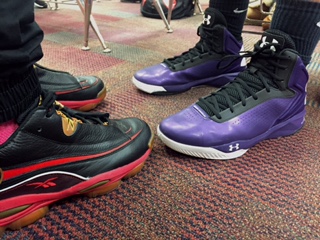Defining a new generation of ‘cool’
January 13, 2016
A word that has been defining members of society since before many can remember: cool. The word is used so often that some forget how their meaning might differ from other’s.
Many define ‘cool’ as wearing the best brands of clothing, being friends with the perfect crowd or being a top athlete in a certain sport. To others, cool means having a likable personality or being confident around others. As trends come and go, the meaning of cool evolves as well.
Junior Calvin Robinson said, “In my opinion, being cool means being someone that people enjoy being around or someone that I admire for a specific reason or trait. Among your peers, being cool is usually based off your personality, although your style of dressing or other factors make a difference as well. However, they only make a difference if your personality is good.”
Over time the definition of cool has changed, not only in general but to particular crowds. While some think cool is defined by materialistic characteristics, others define it as more of a personal reflection on themselves. As children get older, it is common that stereotypes of cool start to fade into their own views on the subject.
Robinson explained, “Cool follows whatever trends pop up in society. When you trace this path you realize just how superficial and unimportant it is. Right now, it is Uggs, joggers, iPhones, hockey and Lululemon. In the 70’s, it was all disco, 80’s Reebok shoes, and now it is Vineyard Vines t-shirts. When you look at this, you realize that all trends pass, and it doesn’t matter how ‘cool’ the trend is in your opinion, whatever society says is cool automatically becomes cool. We need to change that.”
Students sometimes take being ‘cool’ too seriously. It is often seen that teenagers will alter parts of themselves, like their behavior, to fit in with others or to feel popular. The media plays a large role in teenager’s views because of how celebrities are portrayed. Celebrities seen wearing designer brands, eating certain foods or having specific features make teenagers strive to become more like them. Teenagers will start to act more like a well liked celebrity if it means that they can better their reputation.
Junior Melissa Mcelin said, “I think that many people are trying too hard to be someone they are not trying to be ‘cool’. They are taking what they see in magazines and how others are acting, whether it be nice or mean, and are trying to turn themselves into a version that they aren’t comfortable with.”
Again and again, teenagers struggle with self-esteem issues due to how hard they try to change their appearance to please their peers. Feeling accepted to some outweighs the negativity inside teenager’s heads when they are acting differently.
Senior Sami Haumersen said, “People care so much about being cool because that is their way of feeling accepted. If people like what they are wearing or what music they like, they are considered ‘trendy.'”
In society today, if you get under 100 likes on an instagram post, you’re uncool. If you do not have a large amount of twitter followers, you’re uncool. If you don’t have an iPhone blowing up with texts or snapchats most of the time, you’re uncool. Our generation usually cares if what they are about to post will please others, rather than if they think it is cool. If social media did not play as large as a role that it does for teenager’s popularity, teenagers would most likely struggle less with self-esteem issues, since they would not compare themselves to others as much.
Robinson said, “Now we begin to analyze society’s twisted version of cool, which is based off two main things: how attractive you are and who your friends are. Interesting how the most popular and therefore “coolest” people at the school just happen to be the most attractive people that attend the school. Everyone sees these popular kids who are in the “cool” group and envy them for their attractive looks, and it creates a barrier between who is cool and then who is determined uncool as a result.”
Teenagers should stop focusing on how they look to others and if they’re ‘cool’ enough to hang out with a certain crowd. Being ‘cool’ is just a trend that will soon pass by, like the trends now that make someone cool.
Robinson added, “When you think of cool, you should think of someone or something that you genuinely like or enjoy, not something that society tells you and automatically accept is cool because you want to fit in.”








